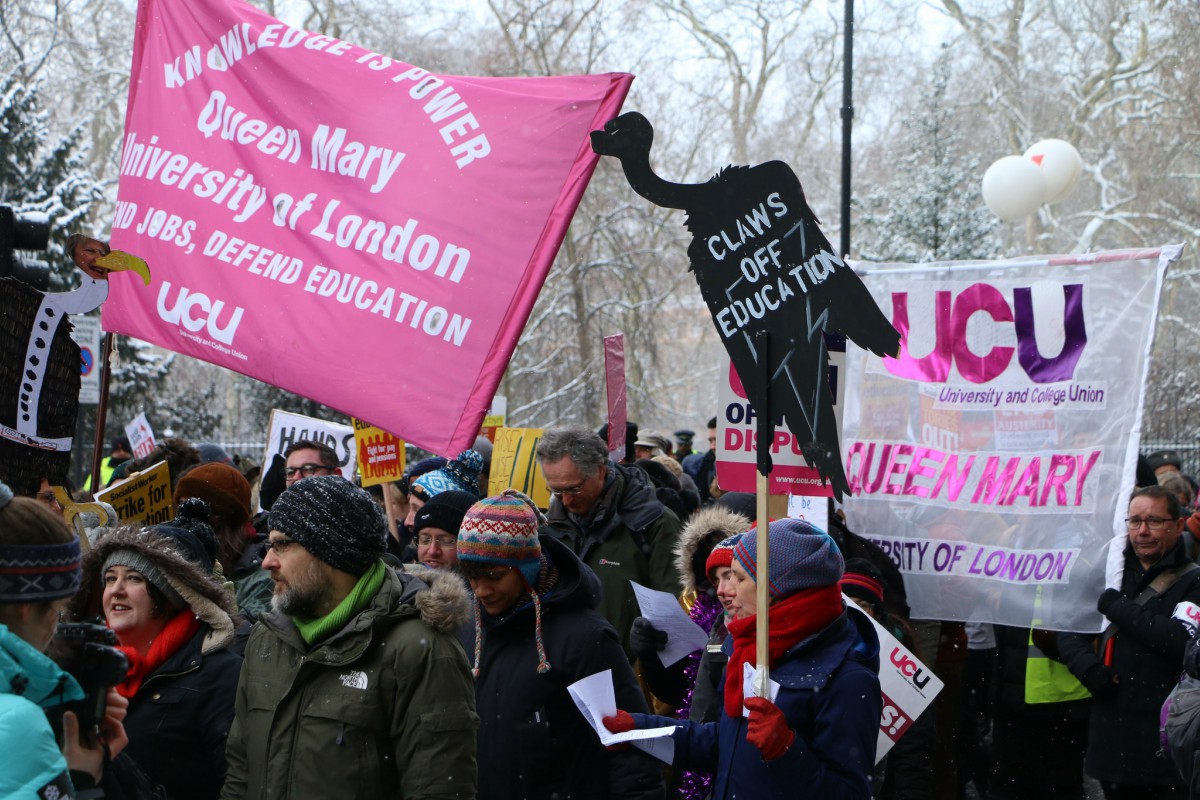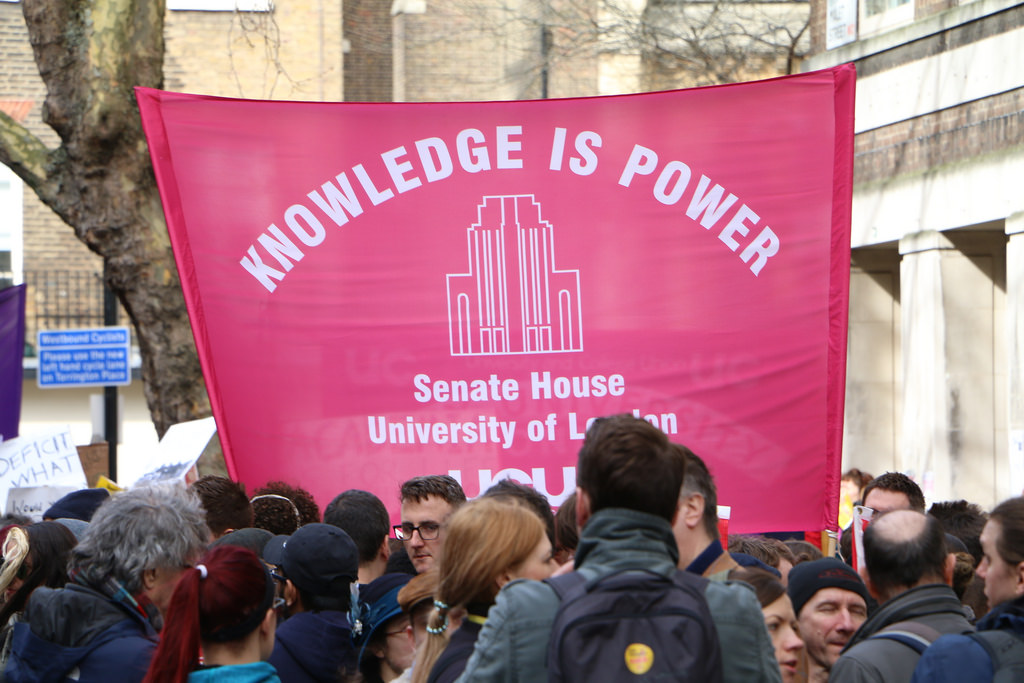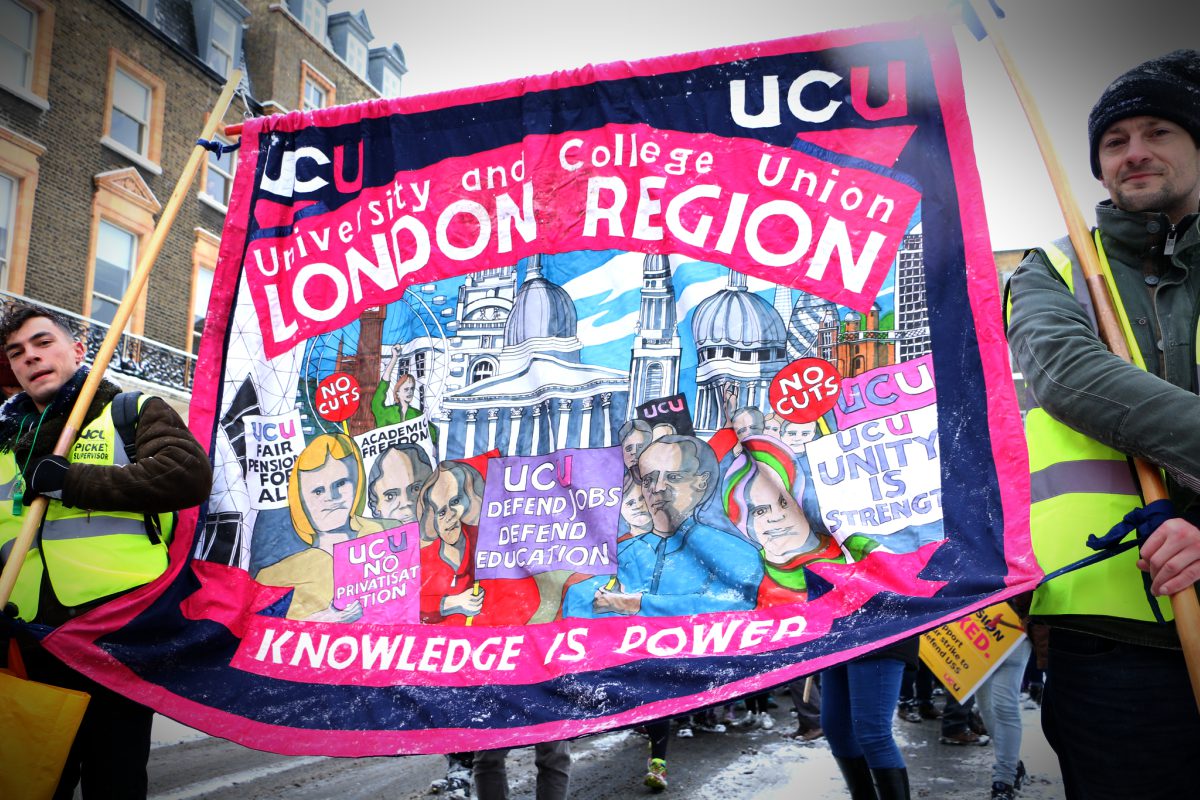Lecturers and academic staff in the UCU are currently voting for a new general secretary for the union. But a failure by the left to unite around one candidate might allow the right wing to steal a victory.
Elections for UCU general secretary are well underway. This could represent a turning point for the union. Outgoing leader Sally Hunt has ruled the roost since the very first general secretary elections in 2007. The left now has an opportunity to wrest control of the union leadership back from the bureaucratic right.
The right-wing candidate, Matt Waddup, is Hunt’s old lieutenant. As former Head of Campaigns, he was partly responsible for the bureaucratic and stifling brake that head office placed on our membership. A vote for him is a vote for the failed strategies of the past, where industrial action was all about getting a seat at the table for ‘respectable’ negotiation with the bosses.
Jo McNeill, the candidate of the UCU Left faction, is a longstanding activist who has promised to create a ‘member-led’ union. McNeill has pledged to listen to the rank-and-file and seriously fight for workers’ interests, particularly around casualisation and pensions.
The other contender is Jo Grady from Sheffield. Grady came to prominence during the big pensions dispute in 2018. She is regarded as a ‘fresh face’ by many members who came into activity at that time.
McNeill and Grady largely share the same programme – one that would provide a welcome break from the current policies and strategy represented by Hunt and Waddup. But both of these left candidates, however, have their limits also.
UCU Left
 The UCU Left faction, for example, has alienated many activists as a result of its failure to present serious opposition to the union’s right-wing leadership for the past 12 years.
The UCU Left faction, for example, has alienated many activists as a result of its failure to present serious opposition to the union’s right-wing leadership for the past 12 years.
Even during the pensions strike in 2018, where the UCU Left correctly put forward a demand for “no cuts” in any deal, the faction’s main slogan was only “for the status quo” – i.e. leaving pensions and pay as they stand. Whatever the intention behind this, the choice of words was telling: it reflected the mild approach of the UCU Left, missing the militant mood amongst members.
Preserving the ‘status quo’ – of job losses, marketisation and attacks on terms and conditions – is not enough. Instead of endless firefighting against cuts and marketisation, UCU members need a concerted, political struggle, hand-in-hand with our brothers and sisters across the sector, against the source of all our problems: the Tory government and the capitalist system it represents.
Furthermore, the UCU Left is regarded by many activists (particularly the new layers acquired during the strike) as bureaucratic in its own right.
For example, the faction’s attitude is that its candidate – McNeill – should be endorsed, no questions asked, simply because it is the biggest organised left front in the union. There was no attempt to democratically discuss with members about the possibility of a left unity candidate in these elections. Such a discussion would offer the best possible chance to bring together new and established activists and defeat Waddup.
Political struggle
 On the other hand, Grady’s manifesto openly appeals to members newly brought into activity by the 2018 pensions strike. Many of these fresh grassroots activists proved very radical at the last annual conference. But they are clearly unimpressed by the established official left faction.
On the other hand, Grady’s manifesto openly appeals to members newly brought into activity by the 2018 pensions strike. Many of these fresh grassroots activists proved very radical at the last annual conference. But they are clearly unimpressed by the established official left faction.
Grady promises to “open up the union to people who have felt excluded” by the existing left front. There is far more buzz from the rank-and-file around Grady than McNeill. But still there are important points missing from her platform.
Grady says that her proposals do not depend on “waiting for a transformative social-democratic or socialist government”, and that “as things stand, we cannot trust any parliamentary party to do the right thing on the issues that matter to us”.
But the Labour Party under Jeremy Corbyn is promising to introduce free education from cradle to grave, and is offering support for our pensions dispute and ongoing pay battles in FE. Isolating our union from “party politics” is to ignore the most important contribution our union can currently make for our members and all workers: fighting for a left-wing government that stands up for workers and opposes austerity.
Grady makes much of her family’s history of trade unionism (her father was active during the 1984-5 NUM strike). She asserts that the UCU must rely on its “own power”.
But her attempts to distance union struggles from a broader, political struggle is a mistake. With the Tories on the edge of collapse, and with Labour gaining ground in national polls, a left-wing government is an imminent prospect. This would represent a very positive step forward for all workers in Britain – university staff included.
Left unity
 There is a danger that these two ‘left’ candidates could split the vote, allowing Waddup to waltz into office on first preferences.
There is a danger that these two ‘left’ candidates could split the vote, allowing Waddup to waltz into office on first preferences.
There is a more conservative, passive layer of the UCU that doesn’t attend branch meetings. Hunt relied on this layer in the past. And Waddup is clearly aiming at this layer also, with his message of “ending factionalism”, “ending the in-fighting” and “bringing the union together” – that is to say, brought together, under the continued leadership of the right wing.
With the polls closing on 23 May and balloting already underway, there is now no time for a proper democratic process to find a unity candidate for the left. This approach would have been the best way forward.
However, the candidates are participating in hustings at universities all over the country, and branches are engaged in emergency meetings to discuss endorsements. These should be used as an opportunity for branches to hold candidates’ feet to the fire, debate their manifestos, and determine which will fight most effectively for their interests.
Branches should then coordinate nationally to ensure the left is united behind one candidate in opposition to Waddup, and campaign for the best possible vote against the discredited status quo.
Fighting leadership
 With a leadership as bold and determined as the rank and file, our 2018 pensions’ strike could have been turned into a sector-wide strike – encompassing FE workers, cleaners and support staff. We could in turn have reached out to public-sector workers like nurses, doctors, teachers and firefighters.
With a leadership as bold and determined as the rank and file, our 2018 pensions’ strike could have been turned into a sector-wide strike – encompassing FE workers, cleaners and support staff. We could in turn have reached out to public-sector workers like nurses, doctors, teachers and firefighters.
All of us are suffering cuts and job losses from Tory austerity, meaning there is huge potential for a general public-sector strike. This would greatly hasten the end of May’s enfeebled government. This is the strategy we need going forward.
After the betrayal of our pension strike, many UCU members feel demoralised. This was reflected in the failure of our last pay ballot to meet the 50 percent threshold.
It is imperative that we take this chance to turn the situation around. With a bold, fighting leadership, democratically accountable to the membership, we could revive the spirit of struggle seen in 2018 on an even higher level.






